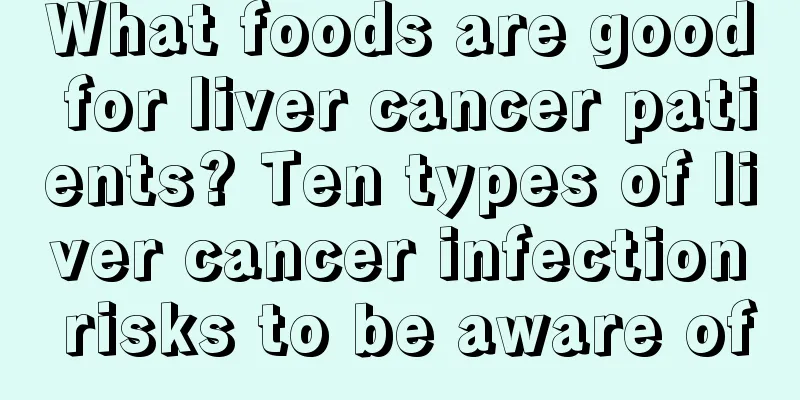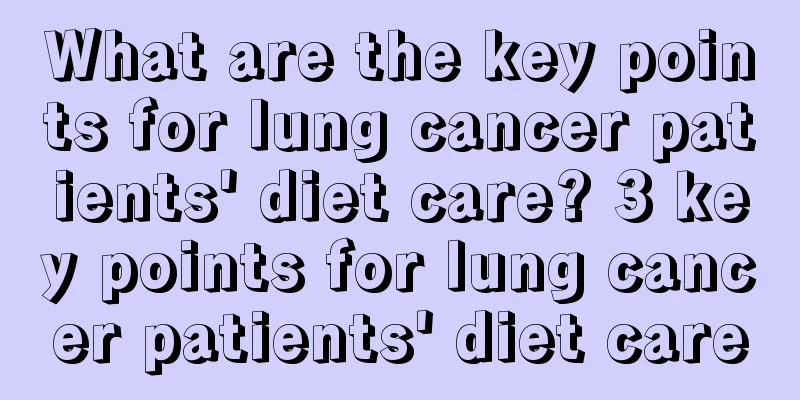What foods are good for liver cancer patients? Ten types of liver cancer infection risks to be aware of

|
Patients with liver cancer should eat more foods that are good for the body. They should eat high-protein and high-vitamin foods every day. These foods will help their body get better faster. They can also eat more foods that enhance appetite. Because many patients will feel that their appetite is not very good during treatment, they can consume some appetizers in moderation. Nutritional disorders: 1. Explain to the patient the importance of nutrient intake and guide the patient to adopt a reasonable diet structure, giving the patient a high-calorie, moderate-protein, high-vitamin, low-fat, easily digestible diet, small meals and frequent meals, and avoid irritating foods. 2. Take measures to increase appetite: 1) Choose food varieties that the patient likes and are suitable for the condition, and change them frequently. Pay attention to color, aroma, taste and nutritional content when cooking. 2) Create a good eating environment, such as fresh air and quietness, and clean up vomit in time. 3. Do not perform any treatment, care or examination that may cause pain or discomfort before or during meals. 4. Take digestive aids and liver protection drugs as prescribed by the doctor. 5. Provide nutritional support as prescribed by the doctor: intravenous high-price nutrition (parenteral nutrition), elemental diet (gastrointestinal nutrition). For care, please refer to the relevant chapters. 6. Take physical examinations of patients regularly to understand their nutritional status. 7. Monitor hemoglobin and give small amounts of blood or albumin transfusions if necessary. Risk of infection 1. Assess potential risk factors for infection and inform patients so that they can cooperate with treatment and care. 2. Strengthen skin care, keep the bed clean and dry, and help the patient turn over once every 2 hours to prevent skin damage and infection. 3. Strengthen oral care during fasting, 2-3 times a day to prevent oral infection. 4. Strengthen nutrition and provide systemic supportive therapy, such as transfusion of fresh blood and amino acids, to enhance the body's defense function and tissue repair ability. 5. When changing dressings, performing treatments, and providing nursing care, strictly follow aseptic operation procedures to cut off the source of infection. 6. Keep the drainage tubes open, observe and record the nature and amount of the drainage, and perform bacterial culture if necessary. Generally, the incision drainage tubes should be removed within 24-48 hours to prevent abdominal infection. 7. Instruct the patient not to open or touch the wound at will to avoid contamination of the wound. 8. Demonstrate effective coughing methods and instruct patients to take measures to prevent incision pain when coughing. 9. Use antibiotics rationally as prescribed by your doctor to prevent and control infection. 10. Guide patients to identify the precursor symptoms of infection so that they can detect signs of infection in a timely and early manner. |
<<: What can you eat to prevent liver cancer? Eating this regularly can prevent liver cancer
>>: Is there a cure for advanced lung cancer? What are the treatments for lung cancer?
Recommend
What are the advantages and disadvantages of bacteria
In the environment we live in, bacteria are every...
What material is best for dentures
Teeth are the most important part of the human or...
What are the ways to lower your heart rate
We all know that a normal person's heart rate...
Symptoms of endometrial precancerous lesions
The emergence of endometrial cancer has caused ma...
What are the taboos for wearing golden obsidian?
Various kinds of ornaments are common in life, an...
How to remove corns on the soles of feet
Because people's feet are often in shoes, the...
What are the dangers of tonsil cysts?
Tonsils are an important part of the human immune...
There are black spots on the stool
Black spots on the stool are usually caused by in...
Why do I lose weight by skipping breakfast?
Eating is an action that every living thing needs...
Will plucking armpit hair cause body odor?
Armpit hair is a normal physiological phenomenon....
How to preserve cosmetics in summer
The weather is hot in the summer, so girls must t...
The function of coral sand
I don’t know if you have ever seen coral sand in ...
Will benign teratoma recur?
Teratoma is a very small tumor that does not caus...
How to detoxify lymph effectively
Lymph is the most important component of our huma...
Traditional Chinese medicine treatment against pancreatic cancer
Effective methods of TCM treatment of pancreatic ...









